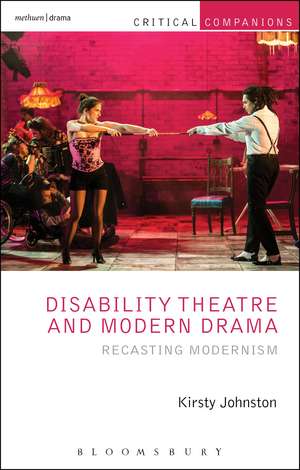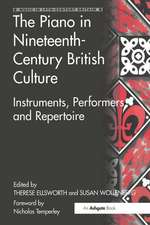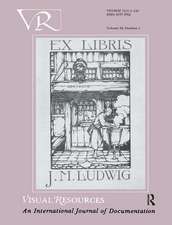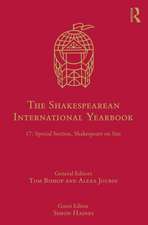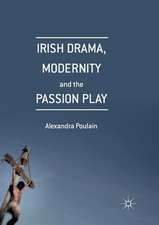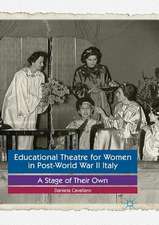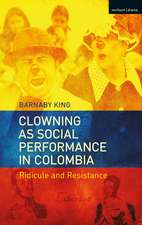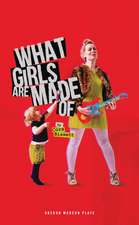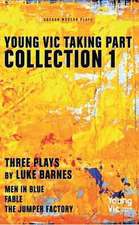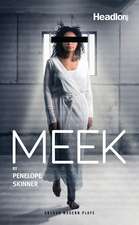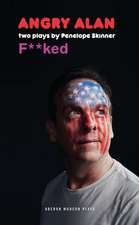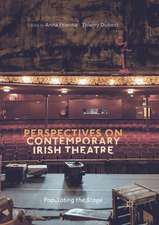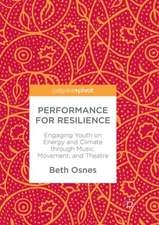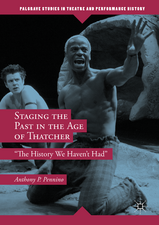Disability Theatre and Modern Drama: Recasting Modernism: Critical Companions
Autor Professor Kirsty Johnstonen Limba Engleză Paperback – 20 apr 2016
| Toate formatele și edițiile | Preț | Express |
|---|---|---|
| Paperback (1) | 177.84 lei 6-8 săpt. | |
| Bloomsbury Publishing – 20 apr 2016 | 177.84 lei 6-8 săpt. | |
| Hardback (1) | 713.61 lei 6-8 săpt. | |
| Bloomsbury Publishing – 20 apr 2016 | 713.61 lei 6-8 săpt. |
Din seria Critical Companions
- 19%
 Preț: 166.07 lei
Preț: 166.07 lei - 11%
 Preț: 178.96 lei
Preț: 178.96 lei - 14%
 Preț: 165.48 lei
Preț: 165.48 lei - 23%
 Preț: 172.01 lei
Preț: 172.01 lei -
 Preț: 180.44 lei
Preț: 180.44 lei - 30%
 Preț: 508.87 lei
Preț: 508.87 lei - 13%
 Preț: 235.71 lei
Preț: 235.71 lei - 23%
 Preț: 172.27 lei
Preț: 172.27 lei - 24%
 Preț: 189.53 lei
Preț: 189.53 lei - 24%
 Preț: 189.53 lei
Preț: 189.53 lei - 14%
 Preț: 178.93 lei
Preț: 178.93 lei - 14%
 Preț: 179.10 lei
Preț: 179.10 lei - 30%
 Preț: 537.95 lei
Preț: 537.95 lei - 14%
 Preț: 178.22 lei
Preț: 178.22 lei - 22%
 Preț: 655.67 lei
Preț: 655.67 lei - 13%
 Preț: 187.26 lei
Preț: 187.26 lei - 22%
 Preț: 598.84 lei
Preț: 598.84 lei - 13%
 Preț: 179.98 lei
Preț: 179.98 lei - 20%
 Preț: 145.55 lei
Preț: 145.55 lei - 30%
 Preț: 567.17 lei
Preț: 567.17 lei - 13%
 Preț: 180.88 lei
Preț: 180.88 lei - 22%
 Preț: 538.67 lei
Preț: 538.67 lei - 22%
 Preț: 598.84 lei
Preț: 598.84 lei - 14%
 Preț: 179.98 lei
Preț: 179.98 lei - 22%
 Preț: 713.61 lei
Preț: 713.61 lei - 22%
 Preț: 568.80 lei
Preț: 568.80 lei - 19%
 Preț: 179.56 lei
Preț: 179.56 lei - 22%
 Preț: 655.67 lei
Preț: 655.67 lei - 14%
 Preț: 179.56 lei
Preț: 179.56 lei - 30%
 Preț: 596.00 lei
Preț: 596.00 lei - 13%
 Preț: 180.52 lei
Preț: 180.52 lei - 14%
 Preț: 172.74 lei
Preț: 172.74 lei - 13%
 Preț: 179.98 lei
Preț: 179.98 lei
Preț: 177.84 lei
Preț vechi: 206.59 lei
-14% Nou
Puncte Express: 267
Preț estimativ în valută:
34.03€ • 35.40$ • 28.10£
34.03€ • 35.40$ • 28.10£
Carte tipărită la comandă
Livrare economică 14-28 aprilie
Preluare comenzi: 021 569.72.76
Specificații
ISBN-13: 9781408184783
ISBN-10: 1408184788
Pagini: 240
Dimensiuni: 138 x 216 x 26 mm
Greutate: 0.3 kg
Editura: Bloomsbury Publishing
Colecția Methuen Drama
Seria Critical Companions
Locul publicării:London, United Kingdom
ISBN-10: 1408184788
Pagini: 240
Dimensiuni: 138 x 216 x 26 mm
Greutate: 0.3 kg
Editura: Bloomsbury Publishing
Colecția Methuen Drama
Seria Critical Companions
Locul publicării:London, United Kingdom
Caracteristici
Covers both dramatic literature and examples of disability theatre practice to broaden appeal
Notă biografică
Kirsty Johnston is associate professor in the Department of Theatre and Film at the University of British Columbia, Canada. Her publications include the monograph Stage Turns: Canadian Disability Theatre (2012) and she has also published in such journals as Modern Drama, Theatre Topics and The Journal of Medical Humanities.
Cuprins
Acknowledgments Introduction Part I: Critical Survey of Disability Theatre Aesthetics, Politics, and Practices 1. What is Disability Theatre? 2. Critical Embodiment and Casting 3. Staging Inclusion 4. Inherited Plays and New Approaches Part II: Critical Perspectives 5. "Every Man his Specialty": Beckett, Disability, and Dependence Michael Davidson (University of California, San Diego, USA)6. Reclaiming the Ordinary Extraordinary Body: Or, The Importance of The Glass Menagerie for Literary Disability Studies Ann M. Fox (Davidson College, USA)7. Access Aesthetics and Modern Drama: An Interview with Jenny Sealey on Graeae Theatre Company's The Threepenny Opera and Blood Wedding Kirsty Johnston 8. Shattering the Glass Menagerie Terry Galloway, M. Shane Grant, Ben Gunter, and Carrie Sandahl (University of Illinois at Chicago, USA)Notes Bibliography Notes on ContributorsIndex
Recenzii
In this highly readable volume, Kirsty Johnson takes seriously the central place of disability within modern theatre. Johnston draws together important theoretical and theatrical insights into the complex commingling of disability and modern drama, powerfully moving beyond reductive approaches that read disability as a metaphor or evaluate representations of disability within a narrow progressive or regressive framework . The result is an excellent, widely applicable work that "recasts" modern drama through creative and contradictory readings of disability history in plays such as Samuel Beckett's Endgame and Tennessee Williams's The Glass Menagerie, as well as through analyses of inclusive practices of casting, training, dramaturgy, and design in contemporary theatre productions that engage with accessibility as not only an ethic but as a generative aesthetic.
A concise overview of the ways in which disability studies can and should fit into new adaptations and analyses of modern drama, in addition to its effects on theatrical practices . Johnston's cultural and historical knowledge about disability history and activism provides readers with noteworthy examples from scholarship and theatre companies that currently engage with the intersection of modern drama and disability studies. In light of growing involvement and interest in disability theatre today, Johnston's book is a crucial resource for theatre scholars and practitioners, both those new to disability studies and those already familiar with its applications, who wish to take part in the complex but promising future that disability theatre has to offer.
In Disability Theatre and Modern Drama, Kirsty Johnston and her collaborators provide indispensable contributions to both theatre studies and disability studies. They incisively demonstrate how attention to disability enriches enduring contestations of both the "modern" and the "drama" of "modern drama" . Disability Theatre and Modern Drama is a timely contribution, remarkable for both its breadth and its depth, including Johnston's impressive integration of disability theory from Canada, the United Kingdom, the United States, and Australia. Individually and collectively, the book's chapters are exceedingly teachable and should find their way to classes in modern drama, disability studies, and performance studies. Moreover, historians and theorists of disability theatre and performance, as well as scholars of modern drama more broadly, would do well to heed the book's numerous prompts for further inquiry.
An accessible academic analysis of the current state of affairs ... [This book offers] a tour through its subject matter that will be equally helpful and illustrative to the novice as to the seasoned scholar.
A valuable, generative book . Johnston has written a book of interest to students, theatre practitioners, scholars, and people who reflect on representation in critical ways or who are interested in considering disability and theatre in tandem . Johnston's work demonstrates the benefits of thinking creatively about how to navigate ableist attitudes and structures. Throughout, she makes a convincing case that disability has a historical role in modern theatre and that attentiveness to disability theatre practices offer creative, compelling choices within this art form. The creative impact of a sustained inquiry into disability theatre is apparent throughout this work; often, the political reverberations are evident as well.
A concise overview of the ways in which disability studies can and should fit into new adaptations and analyses of modern drama, in addition to its effects on theatrical practices . Johnston's cultural and historical knowledge about disability history and activism provides readers with noteworthy examples from scholarship and theatre companies that currently engage with the intersection of modern drama and disability studies. In light of growing involvement and interest in disability theatre today, Johnston's book is a crucial resource for theatre scholars and practitioners, both those new to disability studies and those already familiar with its applications, who wish to take part in the complex but promising future that disability theatre has to offer.
In Disability Theatre and Modern Drama, Kirsty Johnston and her collaborators provide indispensable contributions to both theatre studies and disability studies. They incisively demonstrate how attention to disability enriches enduring contestations of both the "modern" and the "drama" of "modern drama" . Disability Theatre and Modern Drama is a timely contribution, remarkable for both its breadth and its depth, including Johnston's impressive integration of disability theory from Canada, the United Kingdom, the United States, and Australia. Individually and collectively, the book's chapters are exceedingly teachable and should find their way to classes in modern drama, disability studies, and performance studies. Moreover, historians and theorists of disability theatre and performance, as well as scholars of modern drama more broadly, would do well to heed the book's numerous prompts for further inquiry.
An accessible academic analysis of the current state of affairs ... [This book offers] a tour through its subject matter that will be equally helpful and illustrative to the novice as to the seasoned scholar.
A valuable, generative book . Johnston has written a book of interest to students, theatre practitioners, scholars, and people who reflect on representation in critical ways or who are interested in considering disability and theatre in tandem . Johnston's work demonstrates the benefits of thinking creatively about how to navigate ableist attitudes and structures. Throughout, she makes a convincing case that disability has a historical role in modern theatre and that attentiveness to disability theatre practices offer creative, compelling choices within this art form. The creative impact of a sustained inquiry into disability theatre is apparent throughout this work; often, the political reverberations are evident as well.
